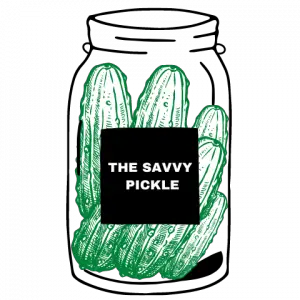Many people often conflate a kosher pickle with a garlic pickle, but it is not that simple. The Jewish community has a very specific way of making pickles that became mainstream in New York during the early 1900s.
What makes a pickle kosher? A kosher dill pickle is a pickle prepared with a salty brine, garlic, and dill. Salt, garlic, and dill are considered kosher ingredients under kosher law.
There is more to a kosher pickle than the ingredients. What does kosher mean? How did they make them? Why did they make them that way?
What Does Kosher Mean?
The term kosher describes the dietary laws of the Jewish faith. This includes what can and can not be eaten, how food is prepared and includes how the meat is acquired. When a food is sold with the kosher label, it is meant to confirm the product comes from a kosher certified entity.
There are basic rules for kosher dietary law. Below are the highlights, but a deeper explanation can be found on the Jewish Virtual Library.
- Certain animals may not be eaten at all. This restriction includes the flesh, organs, eggs and milk of the forbidden animals.
- Of the animals that may be eaten, the birds and mammals must be killed in accordance with Jewish law.
- All blood must be drained from the meat or broiled out of it before it is eaten.
- Certain parts of permitted animals may not be eaten.
- Meat (the flesh of birds and mammals) cannot be eaten with dairy. Fish, eggs, fruits, vegetables and grains can be eaten with either meat or dairy. (According to some views, fish may not be eaten with meat).
- Utensils that have come into contact with meat may not be used with dairy, and vice versa. Utensils that have come into contact with non-kosher food may not be used with kosher food. This applies only where the contact occurred while the food was hot.
- Grape products made by non-Jews may not be eaten.
What Makes a Pickle Kosher?
A pickle is kosher if it is prepared with garlic, dill, and the traditional fermenting techniques are used. This means that a true kosher dill pickle is lacto-fermented, specifically a half-sour. The reason behind this is that vinegar, a common ingredient in pickles, was expensive at the time when the Jews emigrated to the United States. A salt brine was a more affordable option.
These pickles became popularized by the classic Jewish Delis that can still be found in New York City today. In terms of labeling, it is common for people to use the word “kosher” before dill when they mean to use the word “garlic”. Kosher dill has become synonymous with garlic dill in the sense that many people refer to a tissue as a Kleenex. When presented with what is said to be a kosher pickle, if you taste vinegar, that is an indication they are not authentic kosher.
While most people believe this, a Rabbi does not “bless” food to turn it kosher. No Rabbi can waive their hand and turn a food kosher from non-kosher. A Rabbi’s involvement amounts to supervision of food preparation to ensure kosher law is being followed. Kosher dietary law is based on the guidelines for ingredients, raising of the animal, and preparation of the food.
In addition to the food itself, the tools and space for preparation must be also be kosher. This can simply mean using separate utensils and plates when serving meats and cheeses. Fermented pickles did not become a Jewish staple due by accident though. Fermenting vegetables preserved the nutritious qualities and made them available in the cold season when fresh vegetables were not readily available.
How Do You Make Kosher Dill Pickles?
For an authentic kosher dill pickle, you will need to make lacto-fermented pickles with garlic and dill in a salt brine. A great recipe, with instructions for the barrel method, and what to watch out for, has been created by Karen Solomon.
The barrel method is not for beginners, so you may want to start with a mason jar and get comfortable with your timing and understanding the smells of fermented pickles before moving on to advanced techniques. Please note that since these are lacto-fermented pickles, they will keep fermenting after they are transferred to refrigerator storage, just much slower.
Every culture around the world has a different spin on the pickle, and a kosher dill is one of them. Trying another culture’s pickle will not only expand your palette but also expose you to different flavors and pickling techniques you may never knew you enjoyed.
